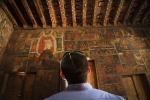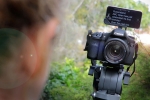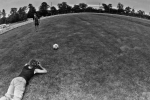Abedi: the stove-maker, the change-maker
[raw]Vimeography Error: a Vimeography gallery with an ID of "26" was not found.[/raw]Through the eyes of an outsider, we see ‘The Lucky Country’ afresh. Omondi S. Abedi shares a rare perspective on Australia, commentating on poverty, wealth and leadership. His experience visiting Queensland is informed by his childhood in the slums of Kampala, Uganda and his steadfast attitude towards ‘white people’. Empowered with a more complex understanding of ‘the other’, Abedi returns to Uganda as a change-maker in his community.
Abedi’s story reminds us that Australia is a global leader and with this privilege comes responsibility.
This is the first film I have made since being in Uganda. For the shoot, I made sure to bring fully charged batteries and the charger too, just in case. Sure enough, after four hours of filming in the mud and dust of Abedi’s ‘factory’, I needed to recharged. Upon searching for a power point however, I realized that his factory did not have a connection to electricity. Returning home to the other side of town was not an option because the traffic is obscene. So I scouted out a café with a powerpoint, plugged in and ordered a juice. Moments later, the power went out. I had no option but to enjoy the freshly-squeezed pineapple juice and wait. An hour or so later, their back-up generator kicked in and I eventually returned to the factory with charged batteries. This is not the worst experience I have had while shooting, however it did remind me of basic practicalities I take for granted in Australia.
I invited Abedi and his young family over for lunch to view the final edit of the film. It was a big journey for them to cross the city and visit the home of muzungus. However, again due to a power outage, I didn’t have a final film to show them. So, after eating and once the power had been restored, Abedi, his wife, his 3 year-old daughter and 2 year-old son balanced on a bench and watched me finish the edit. They were transfixed by the process and even suggested some cuts. Abedi was somewhat apprehensive about the film, wanting to make certain aspects a lot more explicit. However, once I justified my editorial decisions, he became excited and especially loved the use of ‘visual metaphor’, focusing on one of the final shots in which sunshine bursts over his shoulder.
“It’s like the dawn of a new day and hope for the future,” he exclaimed.
Having Abedi’s whole family in my usually private edit space was a very beautiful experience, highlighting how storytelling really does brings people together.




